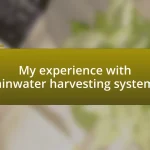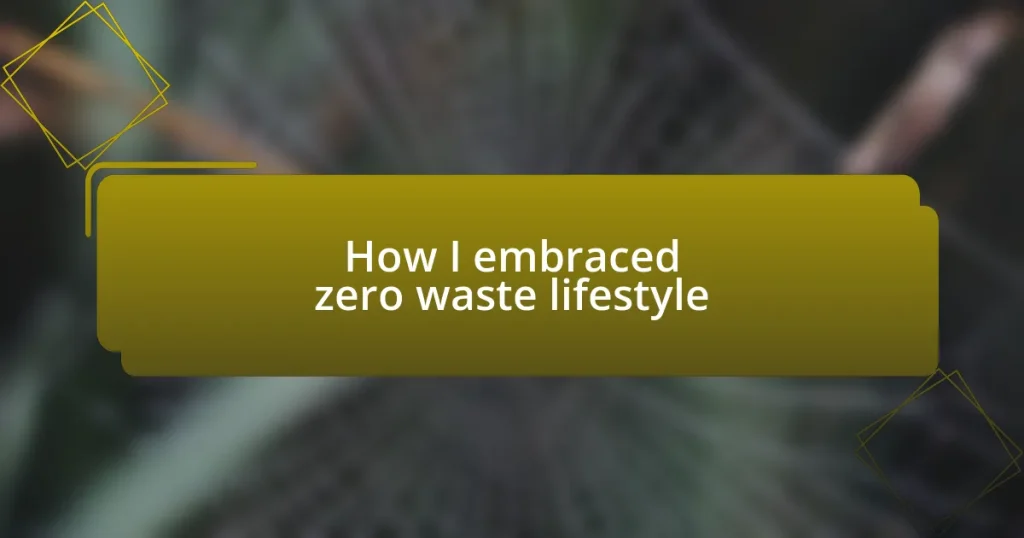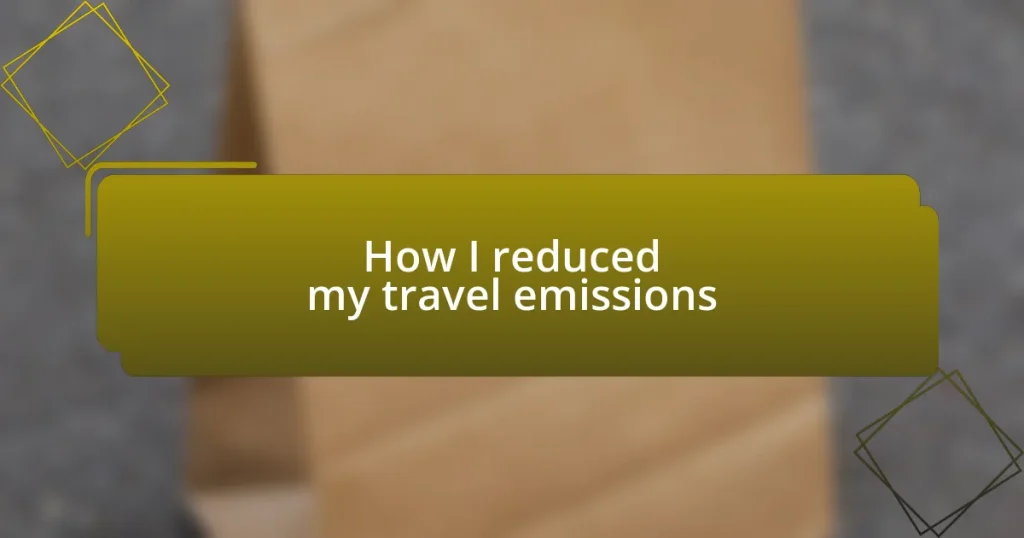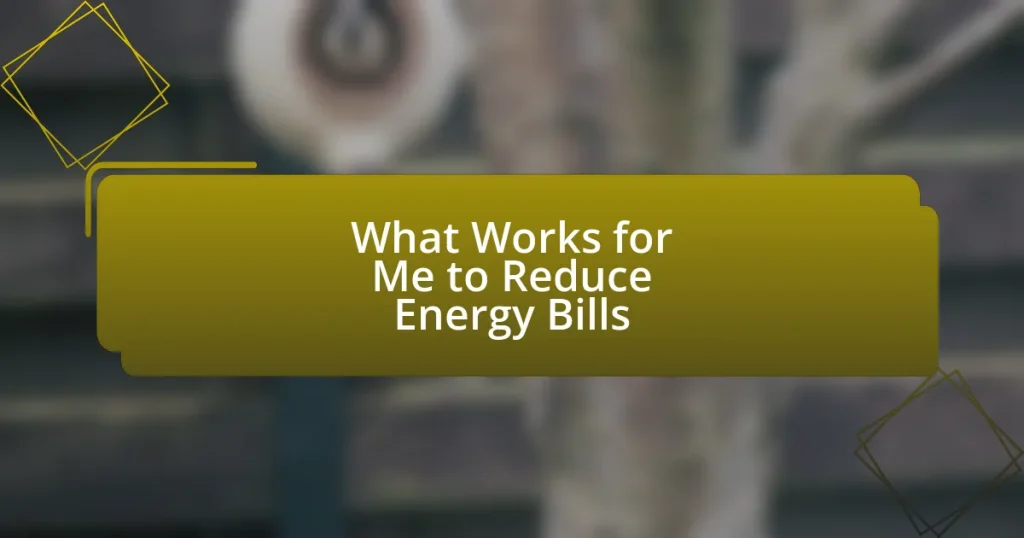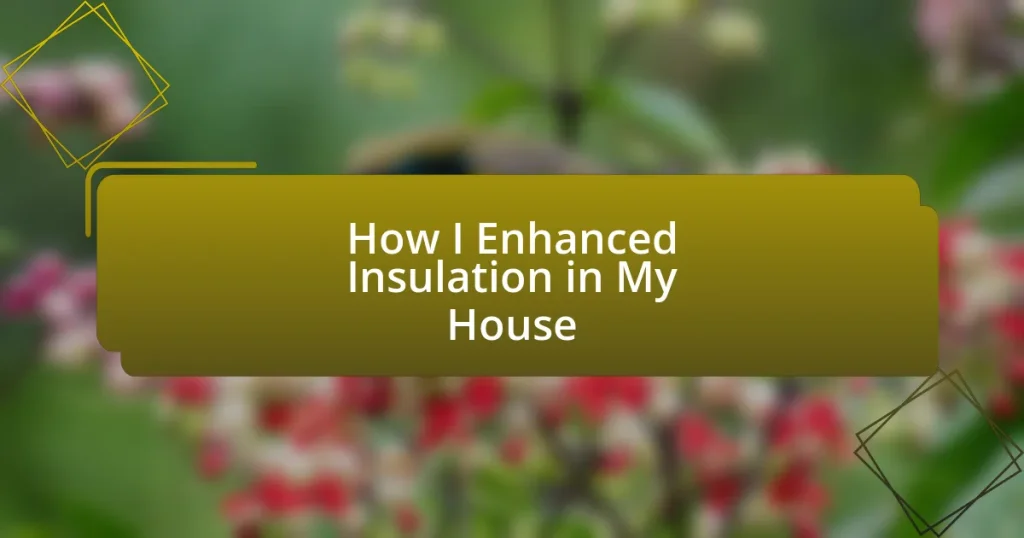Key takeaways:
- Zero waste is about minimizing waste at its source through conscious consumption and lifestyle choices.
- Personal reflection on waste habits, like keeping a waste diary, helps identify areas for improvement and mindful consumption.
- Practical steps, such as reusable bags, meal planning, and composting, significantly reduce waste and enhance sustainability.
- Building a supportive community and participating in local initiatives fosters motivation and shared commitment to zero waste practices.
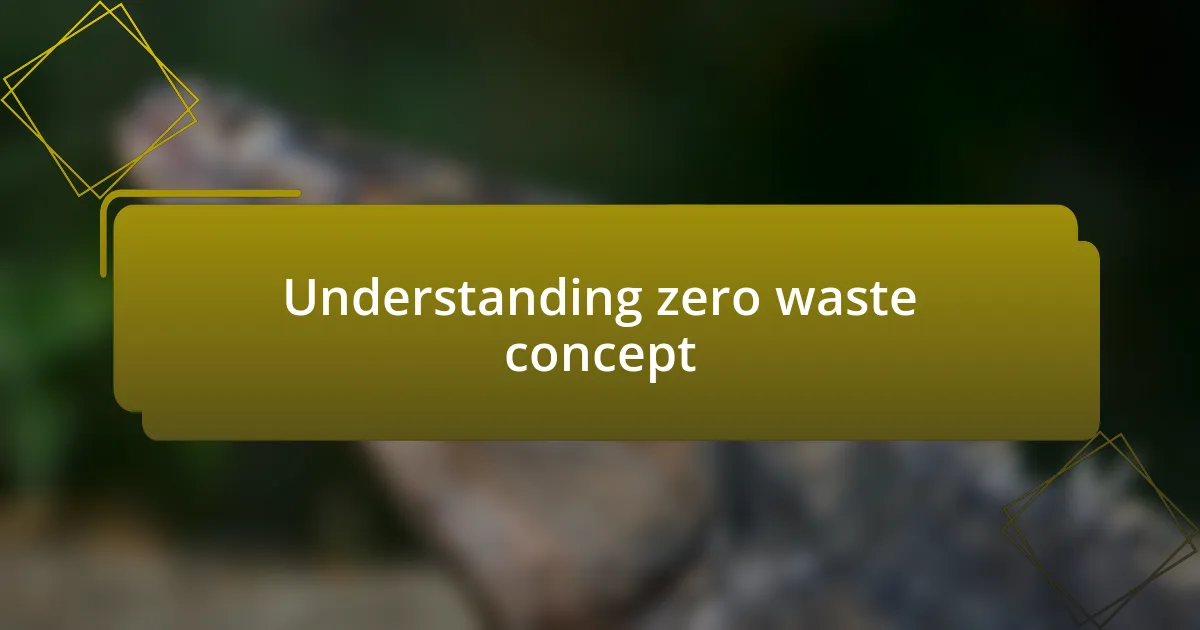
Understanding zero waste concept
Understanding the zero waste concept fundamentally means rethinking how we produce and consume. It’s not just about recycling; it’s about embracing a lifestyle that aims to minimize waste at its source. When I first appreciated this idea, I realized how much waste I generated without even thinking—single-use plastics, excess packaging, and even food scraps.
I still vividly remember my first attempt to reduce waste during a grocery trip. I brought my reusable bags, but I was unprepared for how much packaging was still present. It was an eye-opener! How could I keep saying I cared about the environment while still buying items wrapped in layers of plastic? This moment pushed me to explore bulk shopping and fresh produce from local farmers, leading to fewer items needing packaging altogether.
Zero waste is also about acknowledging the impact of our choices on the environment. Have you ever considered how a simple toothpaste tube contributes to the problem? I was shocked when I learned that millions of these tubes end up in landfills. This prompted me to switch to a toothpaste tablet, sparking a deeper connection with the products I use daily. Embracing zero waste isn’t just an individual journey; it can inspire those around us to consider their own consumption habits.
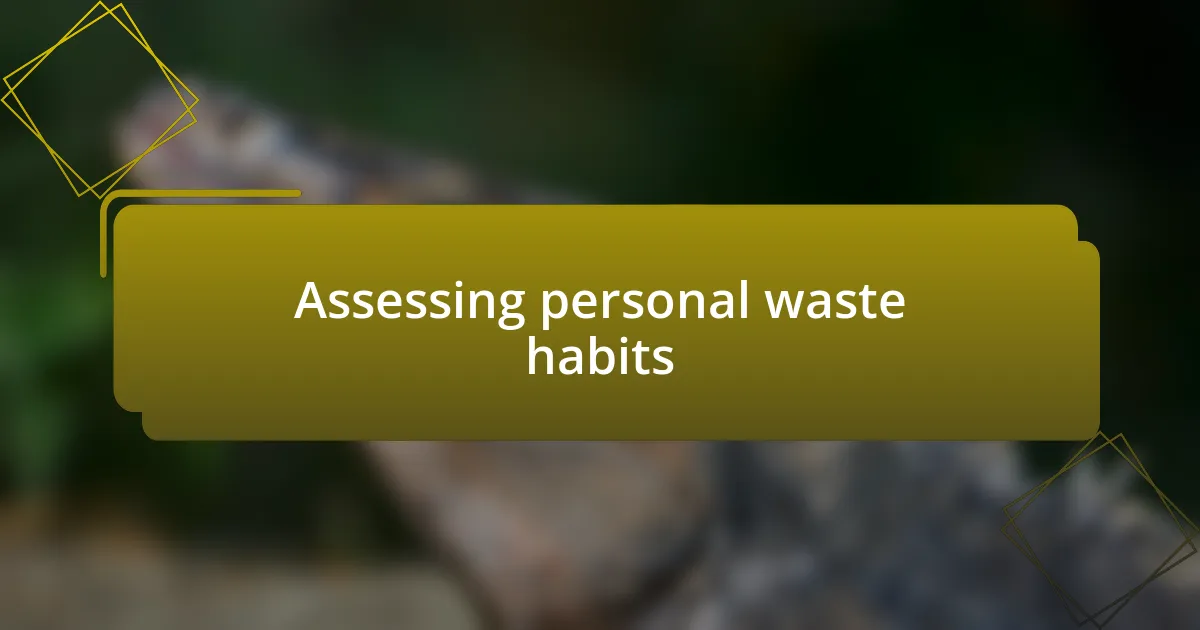
Assessing personal waste habits
Reflecting on my personal waste habits was a pivotal step in my zero waste journey. I started by keeping a waste diary for a week, logging everything I threw away. This exercise revealed surprising patterns—like how much food I discarded simply because I hadn’t planned meals effectively. It was an eye-opening realization that pushed me to be more mindful not just about what I bought, but how I used it.
To further assess my habits, I considered several key areas:
- Packaging: How much of my food came wrapped in plastic?
- Food waste: What items did I toss frequently?
- Single-use products: How many disposable items did I use daily, like paper towels or plastic straws?
- Reuse options: Could I have repurposed or repaired something instead of discarding it?
- Shopping habits: Was I buying in bulk or reaching for the convenience of pre-packaged goods?
By analyzing these areas, I became acutely aware of the changes I needed to make. Embracing a zero waste lifestyle isn’t just an adjustment; it’s a conscious choice to reflect on our habits and their broader impacts.
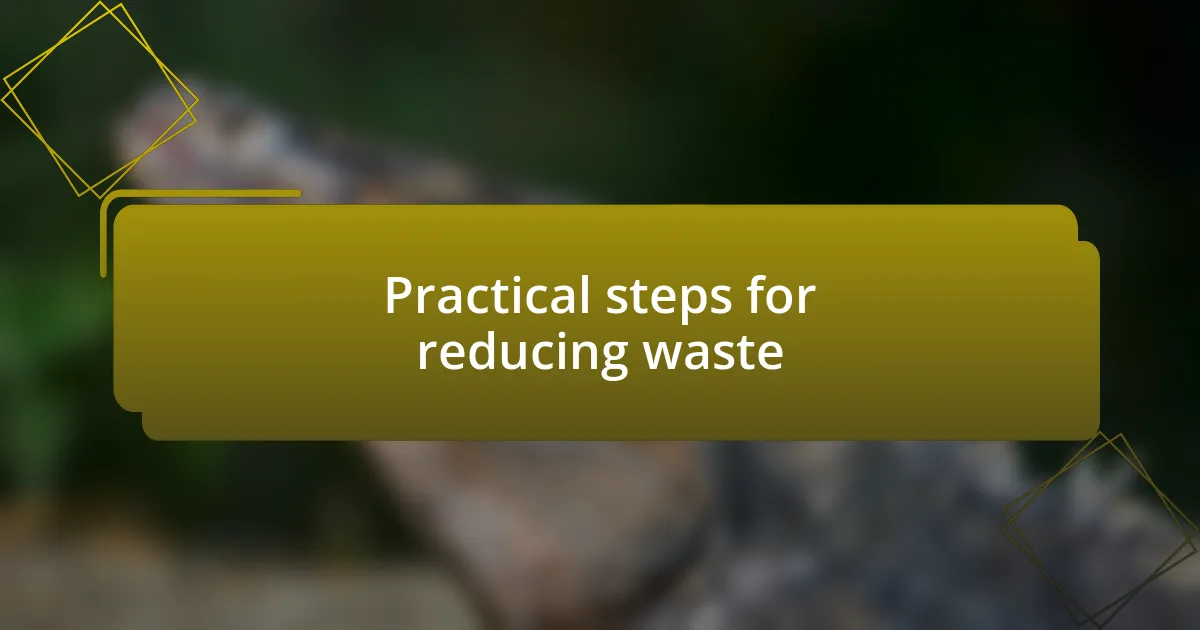
Practical steps for reducing waste
One of the first practical steps I took toward reducing waste was switching to reusable shopping bags. I still remember the time I forgot my reusable bag at home and had to buy yet another plastic one. It felt defeating, as each new bag only added to my growing mountain of guilt. Now, I always keep a stash of bags in my car, so I’m never caught off guard. It might seem small, but this simple change consistently reminds me of my commitment to a zero waste lifestyle.
In my pursuit of waste reduction, I’ve also embraced meal planning. The first time I realized the difference it made was transformative. I went from tossing out nearly half of my groceries to effectively using everything I bought. By creating a weekly plan, I could optimize my shopping list and only get what I needed. This not only cut down the food waste but also saved money, which is a win-win situation for me.
Another step I incorporated was ditching single-use items, like plastic water bottles. This was a bit of a struggle at first. I used to rely on them for convenience, especially during long days at work. Switching to a reusable bottle felt like diving into a new commitment. However, it has become second nature now. Not only do I feel better about reducing my plastic footprint, but I also genuinely enjoy the aesthetically pleasing options available today.
| Action | Impact |
|---|---|
| Reusable Shopping Bags | Reduced plastic waste and increased awareness of buying habits. |
| Meal Planning | Minimized food waste and saved money. |
| Ditching Single-Use Items | Lowered disposable product consumption, fostering a sustainable routine. |
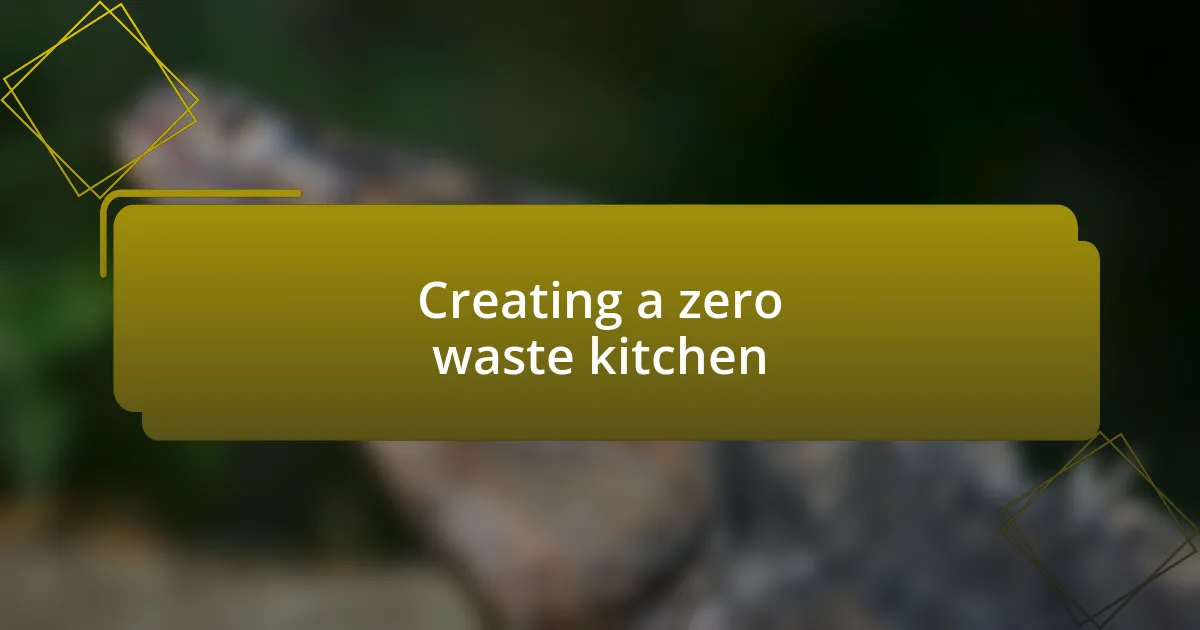
Creating a zero waste kitchen
Creating a zero waste kitchen involves making intentional choices that resonate with your values. One of my most effective changes was swapping out plastic containers for glass jars. I remember the first time I organized my pantry; it felt like turning a chaotic space into a serene showcase. Every jar, filled with bulk grains and spices, not only reduced my plastic consumption but also turned my kitchen into a beautiful and functional space.
Another significant shift was in how I approached food scraps. In the past, I would simply toss them out without a second thought. Now, I’ve transformed peels and leftovers into nourishing compost instead. I still feel a surge of satisfaction when I add to my compost bin, knowing I’m enriching the soil rather than contributing to a landfill. Have you ever paused to consider what your leftover food could become instead of just waste? This simple mindset shift has made me more mindful of my kitchen practices.
Incorporating reusable cloths instead of paper towels was a game changer for me. I used to go through rolls of paper towels without realizing how quickly they added up. Now, using soft cloths feels like a small yet significant rebellion against throwaway culture. Each time I reach for a cloth instead of a disposable option, I can’t help but smile, knowing I’m making a tangible difference in my kitchen’s environmental footprint.
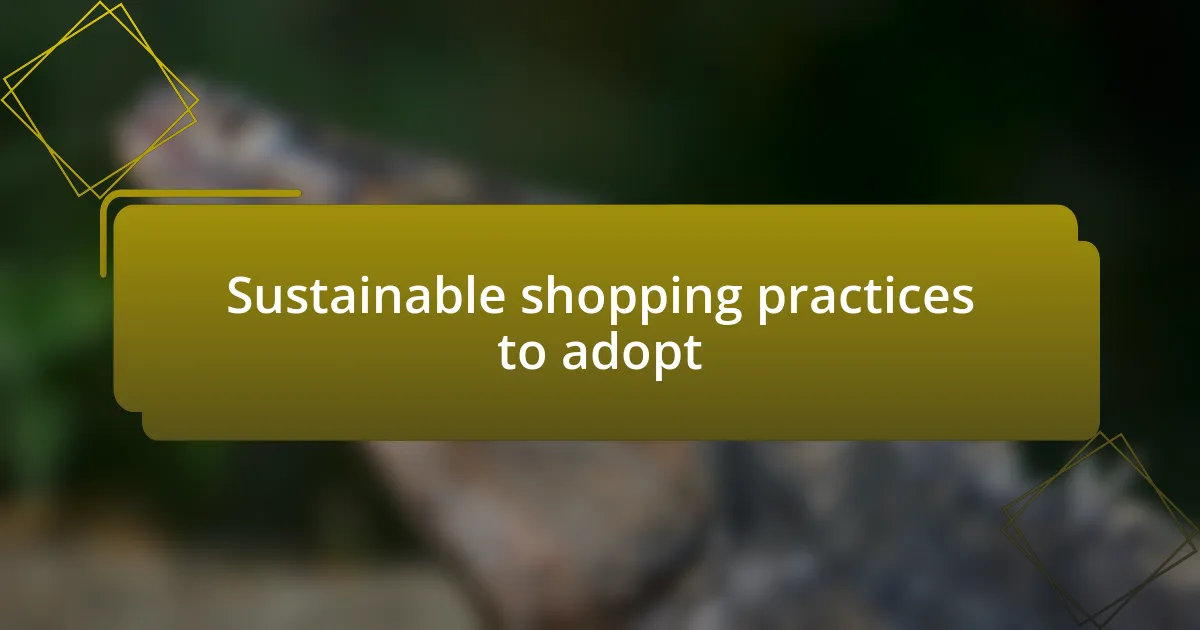
Sustainable shopping practices to adopt
When it comes to sustainable shopping, I found that starting with a clear intention really elevates the experience. For example, I now carry a reusable shopping bag with me everywhere, which not only prevents me from using single-use plastic but also serves as a reminder of my commitment each time I head to the store. Have you ever noticed how much a simple, small change can shape your overall shopping habits?
I also switched to buying in bulk whenever possible. There’s something incredibly satisfying about filling my own containers with grains or nuts, and it truly helps me minimize packaging waste. I remember my first trip to a bulk store; I was excited to see how many options were available without all the extra plastic. It made me realize that sustainable choices can also lead to discovering new favorite snacks and ingredients.
Another practice I adopted is to research brands ahead of my shopping trips. Understanding a company’s values and sustainability efforts ensures that my purchases align with my zero-waste goals. I often ask myself, “Is this brand contributing positively to the environment?” Knowing I’m supporting businesses that share my vision creates a sense of fulfillment that adds to the joy of shopping. Wouldn’t it be wonderful if every purchase felt like a step towards a better planet?
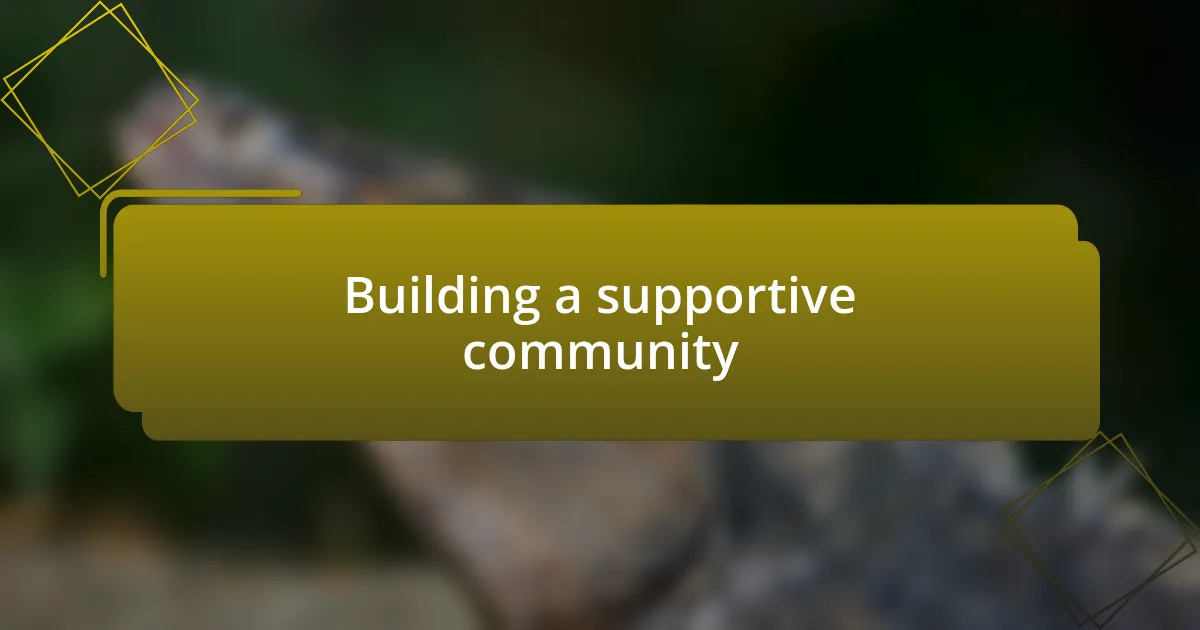
Building a supportive community
Building a supportive community is essential in my journey toward a zero-waste lifestyle. I remember the first time I attended a local sustainability workshop; the energy in the room was electric. It felt like being part of a family that shared my values, and I left with not only new knowledge but also a network of like-minded individuals who were eager to support one another. Have you ever experienced that sense of belonging when surrounded by people who resonate with your mission?
Joining online forums and local social media groups can also be a game changer. I often share my challenges and successes, and in return, I get encouragement and practical tips from others who understand the ups and downs of this lifestyle. There’s something empowering about knowing others are navigating the same waters, don’t you think? It fosters a sense of accountability that keeps us all motivated.
Moreover, participating in community clean-ups or zero-waste challenges has enriched my social life while reinforcing my commitment. I remember my first beach cleanup; it was both heartbreaking and inspiring to see so much waste, yet incredibly fulfilling to know I was part of the solution. Engaging in such activities not only helps the planet but cultivates friendships and connections that turn into lasting support networks. It’s amazing how shared experiences can deepen our resolve to live more sustainably together.








